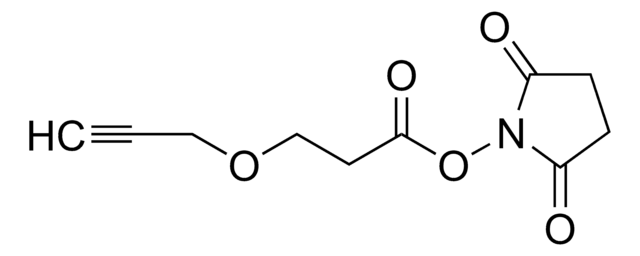803499
PEG4-SPDP (PEGylated, long-chain SPDP crosslinker)
Synonym(s):
2,5-Dioxo-1-pyrrolidinyl 17-oxo-19-(2-pyridinyldithio)-4,7,10,13-tetraoxa-16-azanonadecanoate
Sign Into View Organizational & Contract Pricing
All Photos(1)
About This Item
Empirical Formula (Hill Notation):
C23 H33 N3 O9 S2
CAS Number:
Molecular Weight:
559.65
UNSPSC Code:
12161502
NACRES:
NA.22
Recommended Products
form
oil
Quality Level
mol wt
559.65
reaction suitability
reagent type: cross-linking reagent
storage condition
desiccated
solubility
water: soluble
functional group
NHS ester
shipped in
ambient
storage temp.
−20°C
SMILES string
O=C(CCSSC1=CC=CC=N1)NCCOCCOCCOCCOCCC(ON2C(CCC2=O)=O)=O
Related Categories
General description
SPDP-type reagents have an amine-reactive N-hydroxysuccinimide (NHS) ester at one end and a suflhydryl-reactive 2-pyridyldithiol group at the opposite end. PEG4-SPDP has a 4-unit polyethylene glycol spacer arm, which confers greater solubility to the crosslinker and linked proteins compared to crosslinkers having only hydrocarbon spacers. Pyridyldithiol reagents produce disulfide-containing linkages that can be cleaved with reducing agents such as dithiothreitol (DTT). Crosslinking experiments with SPDP reagents are not limited to those involving proteins. Any of a variety of molecules with primary amines and sulfhydryl groups can be modified or crosslinked using an SPDP reagent.
Features and Benefits
- Reactive groups: NHS ester and pyrirdyldithiol
- Efficient amine conjugation—NHS ester provides effective conjugation to lysines, N-termini of peptides and other primary amines
- Reversible sulfhydryl conjugation—pyridyldithiol group enables disulfide linkage with reduced cysteines and other sulfhydryl groups, providing a stable but cleavable bond
- Polyethylene glycol—PEG groups are flexible, non-immunogenic, hydrophilic, and often enhance the solubility of attached molecules
- Spacer arm—connects primary amines and sulfhydryl targets at distances up to 25.7 angstroms; compare to PEG12-SPDP (54.1 angstroms)
Caution
This product is sensitive to moisture. The vial is packaged in a resealable bag with a desiccant to reduce exposure to moisture. After cold storage, equilibrate the vial to room temperature before opening to reduce condensation inside the vial. Make fresh solutions. Storage of stock solutions is not recommended. After use, return the vial to the resealable bag. Close the bag and store the product at the recommended temperature.
Storage Class Code
11 - Combustible Solids
WGK
WGK 3
Flash Point(F)
Not applicable
Flash Point(C)
Not applicable
Choose from one of the most recent versions:
Certificates of Analysis (COA)
Lot/Batch Number
Don't see the Right Version?
If you require a particular version, you can look up a specific certificate by the Lot or Batch number.
Already Own This Product?
Find documentation for the products that you have recently purchased in the Document Library.
Customers Also Viewed
Neurath, A. R. and Strick, N.
J. Virol. Methods, 3, 155-165 (1981)
Preparation of antibody-toxin conjugates.
A J Cumber et al.
Methods in enzymology, 112, 207-225 (1985-01-01)
Our team of scientists has experience in all areas of research including Life Science, Material Science, Chemical Synthesis, Chromatography, Analytical and many others.
Contact Technical Service











